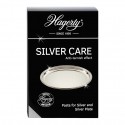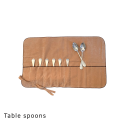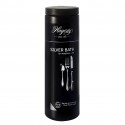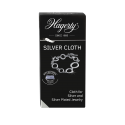25 February 2022
How to clean tarnished silver?
Silver cutlery and silverware are essential items in the art of tableware. The problem is that over time, silverware oxidises and black spots can appear. How do you clean tarnished silverware? Discover some tips to make your life easier every day.
Why does silver tarnish?
Deposits on silverware consist of silver sulphide. This is a solid black salt formed when silver comes into contact with oxygen and hydrogen sulphide. It is present in the air and some foods. Therefore, tarnishing is a classic oxidation process.
How to clean tarnished silver?
Tarnish usually disfigures silver objects. It can be removed by polishing or other techniques, but this type of cleaning is very labour intensive. In addition, each polishing removes a small amount of silver. On silver-plated objects, the operation may damage the thin silver plating or even remove it entirely.
Therefore, it is best to prevent tarnishing where possible. For this purpose, silver jewellery, antique silver, silver cutlery or any tarnished silver objects you may have, should be protected from tarnishing.
To clean tarnished silver, conventional household products or detergents can be used. However, it is strongly recommended to use special, professional polishing cloths and cleaners.
Cleaning silver with bicarbonate
Baking soda or baking powder are indispensable products in every household. They remove red wine stains from fabric sofas and clean silver objects.
Mix baking soda with water to make a paste. Then apply the formula to your jewellery or silverware by rubbing gently with a toothbrush. After half an hour, rinse with clean water, wipe with a cloth and polish.
This technique can help but is not optimal. Instead, it is advisable to use a professional product specifically for silver.
Cleaning silver with white vinegar
To clean silverware, you can also soak it in a mixture of hot water and white vinegar. For the dosage: pour one cup of crystal vinegar into 1 litre of water, put your silverware in and wait 15 to 30 minutes.
If your silverware is covered with black spots, try soaking it in undiluted hot white vinegar for a quarter of an hour.
After the bath, take the items out and wash them with an non-abrasive sponge in soapy water to stop the effects of the white vinegar.
Vinegar gives off unpleasant odours and is not specifically suitable for cleaning silverware. Therefore, use a professional product, designed and tested for cleaning silver objects, before opting for this solution.
How can I prevent silver from tarnishing?
In order to keep your silver sparkling and to avoid having to polish it too often, there are various appropriate storage techniques, combined with regular use and careful washing.
Store your silverware correctly
Store your silverware in a dry place away from high temperatures. Both humidity and heat increase the rate at which silver tarnishes.
To keep your silverware and silver jewellery shiny, place them in rooms in your home that meets these requirements.
China cabinets are ideal for storing fine tableware, as they regulate airflow to maintain a constant temperature and do not retain excessive moisture.
Do not pack or store silverware with materials that promote tarnishing. Many common household items can be harmful to your silver because they contain chemicals or create environments that encourage tarnish.
- These include newsprint and other common wrapping papers. The ink on them is acidic and can damage silver.
- Plastic bags can also promote tarnish; they also retain moisture and prevent ventilation, which is not good.
- Cardboard boxes are not recommended for storage, as they retain moisture and do not allow for proper ventilation.
- Finally, do not bundle your silver with rubber bands. They contain sulphur and this leads to tarnishing.
Maintain your silver regularly
Take your silver out of storage and use it! A great way to prevent tarnish from forming on your items is to use them. Most people clean their silverware after using it and you should.
When storing your silverware, make sure you alternate plates and cutlery so that they are all used equally. Otherwise, the less used ones will start to tarnish.
Wash your silverware after each use
Clean silverware with hot and soapy water. It is a good idea to clean it directly after you have finished using it, as oils from your skin or food residues can start to chemically react with the silver and damage it.
We recommend that you have clean hands when handling silver. You may also consider wearing cotton gloves.
Do not put your silverware in the dishwasher. This does not cause tarnishing, but cleaning silver in the dishwasher can leave marks. It is therefore best to always clean it by hand and with care.
Do not let silver dry in the open air, as drops of water can leave stains. Use a soft flannel or cotton cloth and gently rub the surface of the silver in small circles.
How to protect and clean silver effectively?
Hagerty offers various silver cleaners and anti-tarnish care products that effectively protect and clean your silver (bath, polishing cloth, foam, polish, paste). If you want to protect and shine your silver, here are some products that will satisfy you:
Hagerty Silver Bath: Silver Cutlery Cleaning Bath
The bath thoroughly cleans and restores the shine of tarnished forks, spoons, knives and other silver objects. Silver Bath protects against oxidation and does not cause micro-scratches on the metal.
Hagerty Silver Care: Silver Polish Paste
Clean and care for silver and silver-plated objects with the Silver Care paste. It maintains, restores lustre and polishes oxidised metals without damaging the surface.
Hagerty Silver Guard: protective cover for silver cutlery
Hagerty has 8 different sizes of impregnated covers that protect and care for your silverware. They keep your silverware safe from oxidation caused by sulphur in the air and prevent it from turning black too quickly. Each pouch can hold up to 12 pieces of cutlery.
Hagerty Silver Cloth: Silver-polishing cloth for jewellery
You should also take care of your silver jewellery. Give your bracelets, necklaces, earrings or silver rings a perfect shine by buffing them with a polishing cloth. The cleaning is easy, gives instant results and does not cause any marks on silver or silver-plated metal..png)
For tips on the perfect table setting, check out the following blog: Tableware, Dinnerware, and Table Manners Q&A: Tips and Advice.



